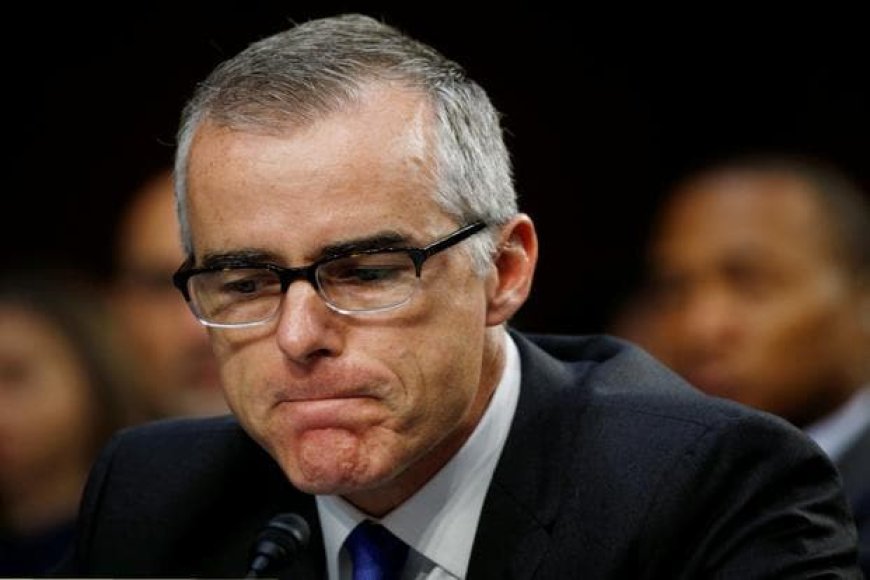Former Acting FBI Director Andrew McCabe Fired Amid Fallout from Jan. 6 Investigations
Andrew McCabe, former acting FBI director tied to the Capitol riot investigations, has been fired. Explore the reasons behind the termination and its political impact.

Washington, D.C. – August 8, 2025 — In a development stirring fresh controversy in Washington, former acting FBI Director Andrew McCabe has been officially terminated from his advisory position with the Department of Justice. McCabe, who played a significant behind-the-scenes role in the early investigative frameworks of the January 6th Capitol riot, was let go this week following what sources call a "shift in departmental priorities and public accountability."
McCabe, who served as the acting FBI director in 2017 following the dismissal of James Comey, has remained a polarizing figure in the world of federal law enforcement. While no longer serving in a top leadership capacity, he had been retained in a consulting role for the Justice Department—primarily advising on national security and domestic terror assessments, including key aspects of the Jan. 6 probe.
Termination Tied to Oversight Pressure
The decision to sever ties with McCabe appears to be connected to growing pressure from oversight committees on Capitol Hill. Republican lawmakers have intensified calls for transparency and personnel accountability surrounding the events of Jan. 6 and their aftermath.
An internal review reportedly concluded that McCabe’s continued involvement in Jan. 6 matters posed a “conflict of interest” given his prior controversies related to FBI conduct during the 2016 and 2017 election cycles. Though the DOJ has yet to issue a formal statement, multiple officials, speaking on condition of anonymity, confirmed the firing occurred late Monday evening.
Political Response and Fallout
The political reaction has been swift and polarized.
Senator Josh Hawley (R-MO) praised the decision, stating, “This is a necessary step toward rebuilding public trust in the Department of Justice. Andrew McCabe should never have had a role in federal decision-making after what we’ve seen in the past.”
Conversely, Democratic lawmakers like Rep. Jamie Raskin (D-MD) have condemned the firing as “a dangerous signal that career intelligence officials are being removed for political optics.”
As of now, President Donald Trump has not publicly commented on McCabe’s termination, although he had previously criticized McCabe throughout his presidency, calling him part of the “deep state” and a symbol of FBI misconduct.
McCabe’s Role in the Jan. 6 Timeline
Though McCabe was not in active federal service on January 6, 2021, his advisory contributions were reportedly crucial in identifying militia coordination patterns, online radicalization hubs, and possible foreign influence operations that may have played a role in the planning or execution of the Capitol breach.
In an interview from earlier this year, McCabe stated that “the threat of domestic violent extremism remains one of the most serious challenges facing American democracy.”
His departure now raises questions about the future direction of the DOJ’s domestic extremism policies.
Legal and Media Implications
While McCabe himself has not been accused of misconduct related to Jan. 6, his long-standing friction with both political parties makes his firing a lightning rod issue for news cycles and legal analysts alike. Some speculate that further staffing changes could come in the DOJ as the Trump administration intensifies its review of all officials involved in the high-profile investigation.
According to Brookings Institution, politically driven staffing adjustments in federal law enforcement can significantly alter both public perception and investigative trajectories.
Additionally, Lawfare has warned that interference in DOJ personnel decisions risks undermining institutional independence at a critical time.
What’s Next for McCabe?
At 57, McCabe has had a long and controversial career in federal intelligence. After leaving the FBI, he became a frequent contributor to CNN and published a memoir titled The Threat, in which he defended the bureau’s integrity and his role during the turbulent Trump years.
Whether McCabe will return to public commentary or take legal steps in response to his termination remains to be seen. A spokesperson for McCabe declined to comment on the record.
Conclusion:
The firing of Andrew McCabe marks a significant moment in the ongoing political reverberations from the Capitol riot investigations. It underscores the persistent battle over who controls federal narratives—and how historical accountability is enforced.











